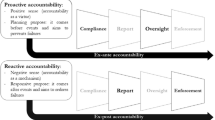Abstract
Currently there is hardly any connection between philosophy of science and Artificial Intelligence research. We argue that both fields can benefit from each other. As an example of this mutual benefit we discuss the relation between Inductive-Statistical Reasoning and Default Logic. One of the main topics in AI research is the study of common-sense reasoning with incomplete information. Default logic is especially developed to formalise this type of reasoning. We show that there is a striking resemblance between inductive-statistical reasoning and default logic. A central theme in the logical positivist study of inductive-statistical reasoning such as Hempel’s Criterion of Maximal Specificity turns out to be equally important in default logic. We also discuss to what extent the relevance of the results of Logical Positivism to AI research could contribute to a reevaluation of Logical Positivism in general.
Similar content being viewed by others
REFERENCES
Benthem, J. F. A. K. van: 1989, ‘Semantic Parallels in Natural Language and Computation’, in: H-D. Ebbinghaus, J. Fernandez-Prida, M. Carrido, D. Lascar and A. Rodriquez Artalejo (eds.), Logic Colloquium Granada 1987, North-Holland, Amsterdam, pp. 331–375.
Benthem, J. F. A. K. van: 1990, ‘Inference, Methodology and Semantics’, in: A. Blynov and P. Bystrov (eds.), Festschrift for Vladimir Smirnov, Philosophical Institute, Academy of Science of the USSR, Moskow.
Besnard, P.: 1989, An Introduction to Default Logic, Springer Verlag, Berlin.
Buchanan, B. and E. Shortliffe: 1984, Rule-based Expertsystems: The MYCIN Experiments of the Stanford Heuristic Programming Project, Addison-Wesley, Reading, MA.
Carnap, R.: 1948, Meaning and Necessity, Chicago University Press, Chicago.
Etherington, D. W.: 1987, ‘Formalizing Nonmonotonic Reasoning Systems’, Artificial Intelligence 31.
Etherington, D. W.: 1988, Reasoning with Incomplete Information, Pitman, London.
Ginsberg, M. (ed.): 1987, Readings in Non-Monotonic Logic, Morgan Kaufman, Los Altos, CA.
Halpern, J.: 1986, ‘Reasoning about Knowledge: an Overview’, Proc. of the First Conference about Theoretical Aspects of Reasoning about Knowledge, Morgan Kaufman, Los Altos, CA.
Hempel, C. G.: 1965, ‘Aspects of Scientific Explanation’, in: C. G. Hempel, Aspects of Scientific Explanation and other Essays in the Philosophy of Science, The Free Press, New York.
Hempel, C. G.: 1968, ‘Maximal Specificity and Law likeness in Probabilistic Explanation’, Philosophy of Science 35, 116–33.
Hintikka, J.: 1962, Knowledge and Belief, Cornell University Press, Ithaca.
Horty, J., R. Thomason, and D. Touretzky: 1987, A Skeptical Theory of Inheritance in Nonmonotonic Semantic Networks, Technical Report CMU-CS-87-175, Carnegie Mellon University, Pittsburgh.
Humphreys, W.: 1968, ‘Statistical Ambiguity and Maximal Specificity’, Philosophy of Science 35, 112–5.
Janssen, M. C.W. and Y. H. Tan: 1991, ‘Why Friedman’s Non-monotonic Reasoning Defies Hempel’s Covering Law Model’, Synthese 86, 255–84.
Janssen, M. C. W. and Y. H. Tan: 1992, ‘Friedman’s Permanent Income Hypothesis as an Example of Diagnostic Reasoning’, Economics and Philosophy 8, 23–49.
Konolige, K.: 1988, ‘On the Relation Between Default and Autoepistemic Logic’, Artificial Intelligence 35, 343–82.
Kraus, S., D. Lehmann and M. Magidor: 1990, ‘Nonmonotonic Reasoning, Preferential Models and Cumulative Logics’, Artificial Intelligence 44, 167–207.
Kuipers, T. A. F: 1978, Studies in Inductive Probability and Rational Expectation, Reidel, Dordrecht.
Langley, P. and J. Zytkow: 1989, ‘Datadriven Approaches to Empirical Discovery’, Artificial Intelligence 13.
Langley, P., J. Zytkow, H. Simon and G. Bradshaw: 1987, Scientific Discovery: Computational Explorations of the Creative Processes, MIT Press, Cambridge MA.
Lewis, D.: 1969, Convention: A Philosophical Study, Harvard University Press, Harvard.
Lewis, D.: 1973, Counterfactuals, Blackwell, Oxford.
Lukaszewicz, W.: 1990, Non-Monotonic Reasoning – Formalization of Common Sense Reasoning, Series in Artificial Intelligence, Ellis Horwood, Chichester.
Marek, W. and M. Truszczynski: 1993, Nonmonotonic Logic: Context-Dependent Reasoning, Springer-Verlag, Berlin.
McCarthy, J.: 1980, ‘Circumscription – A Form of Non-monotonic Reasoning’, Artificial Intelligence 13, 27–39.
Moore, R. C.: 1985, ‘Semantical Considerations on Nonmonotonic Logic’, Artiflcial Intelligence 25, 75–94.
Poole, D.: 1990, ‘The Effect of Knowledge on Belief: Conditioning, Specificity and the Lottery Paradox in Default Reasoning’, Artificial Intelligence 49, 281–307.
Prakken, H.: 1993, ‘An Argumentation Framework in Default Logic’, Annales of Mathematics and Artificial Intelligence 9, 91–131.
Reiter, R.: 1980, ‘A Logic for Default Reasoning’, Artificial Intelligence 13, 81–132.
Reiter, R.: 1987, ‘A Theory of Diagnosis from First Principles’, Artificial Intelligence 32, 57–96.
Risch, V. and C. Schwind: 1994, Tableau-based Characterization and Theorem proving for Default Logic, Journal of Automated Reasoning 13, 223–242.
Salmon, W. C.: 1990, Four Decades of Scientific Explanation, University of Minnesota Press, Minneapolis.
Schaerf, M. and M. Cadoli: 1995, ‘Tractable Reasoning via Approximations’, Artificial Intelligence 74, 1–62.
Shoham, Y.: 1988, Reasoning about Change. Time and Causation from the Standpoint of Artificial Intelligence, MIT Press, Cambridge MA.
Stegmüller, W.: 1983, Erklärung, Begründung, Kausalität, Second edition, Springer Verlag, Berlin.
Sterling, I. and E. Shapiro: 1986, The Art of Prolog, MIT Press, Cambridge MA.
Suppe, F.: 1977, The Structure of Scientific Theories, second edition, University of Illinois Press, Urbana.
Thagard, P.: 1988, Computational Philosophy of Science, MIT Press, Cambridge MA.
Tan, Y. H.: 1988, ‘Explanations with Incomplete Information; a Problem for Hempel’s Theory about Causal Explanations’, in W. Callebaut and P. Mostert (eds.), Proceedings of the 9th Dutch Philosophy Conference, Eburon, Delft (in Dutch).
Tan, Y. H.: 1991, ‘Non-monotonic Epistemic Aspects of Scientific Explanations’, Logique et Analyse 133-134, 197–220.
Touretzky, D., Horty, J. and Thomason, R.: 1987, ‘A Clash of Intuitions: The Current State of Nonmonotonic Multiple Inheritance Systems’, Proceedings of the 10th International Joint Conference on Artificial Intelligence, IJCAI’87, 476–482.
Veltman, F.: 1996, ‘Defaults in Update Semantics’, to appear in the Journal of Philosophical Logic.
Author information
Authors and Affiliations
Rights and permissions
About this article
Cite this article
Tan, YH. Is Default Logic a Reinvention of Inductive-Statistical Reasoning?. Synthese 110, 357–379 (1997). https://doi.org/10.1023/A:1004999920152
Published:
Issue Date:
DOI: https://doi.org/10.1023/A:1004999920152




